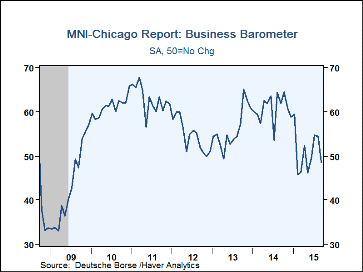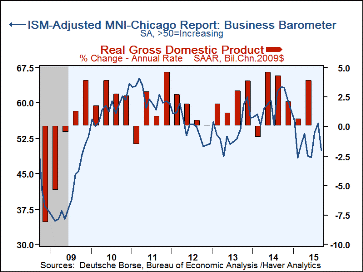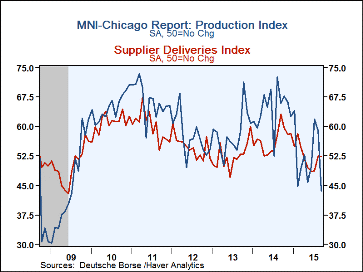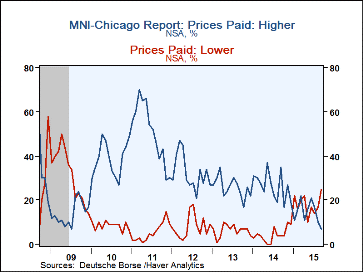 Global| Sep 30 2015
Global| Sep 30 2015Chicago Business Barometer Slumped in September
by:Sandy Batten
|in:Economy in Brief
Summary
The Chicago Business Barometer plummeted to 48.7 in September from 54.4 in August. This is lowest reading since May 2015 and was led by sharp declines in production and new orders. The drop in the index to below 50 points to a [...]
The Chicago Business Barometer plummeted to 48.7 in September from 54.4 in August. This is lowest reading since May 2015 and was led by sharp declines in production and new orders. The drop in the index to below 50 points to a contraction in economic activity in the Chicago area in September. This was the fifth time this year that the index has fallen into contraction territory. Respondents to a survey conducted by Action Economics had expected a marginal decline to 53.4 in September. Large monthly swings are not uncommon for this index. Over the year to August 2015, the average absolute monthly change was nearly four points. So, while a 5.7-point monthly drop is large, it is not extraordinary for this index. It had jumped up 5.3 points in July from June.
Nonetheless, the September reading points to weaker activity and is in line with other recently released regional economic surveys (notably the Philadelphia Fed's index of business activity and the New York Fed's Empire State Manufacturing Survey). Haver Analytics calculates an alternative index that employs the methodology used by the Institute for Supply Management to construct its index of activity (to be released tomorrow). This figure was 50.1 in September. Though still in expansion territory, this ISM-adjusted measure also fell significantly from August.
Of the Barometer's five components, three were below the 50 expansion threshold while two were above. The production index exhibited the most weakness, falling 15.4 points to 43.6, its lowest reading since July 2009 when the overall economy was just exiting the recession associated with the 2008-09 financial crisis. The new orders index also declined meaningfully in September. Both of these key activity indicators are currently running well below their historical averages.
The September survey contained a special question concerning what was impacting business. Just under 30% of the respondents said that China's economic woes had a greater impact on them than had problems in Europe. A little under 20% cited the EU as a bigger influence, while nearly 30% said that neither of these had significantly affected business.
The MNI Chicago Report is produced by MNI/Deutsche Borse Group in partnership with ISM-Chicago. The survey covers a sample of over 200 purchasing professionals in the Chicago area with a monthly response rate of about 50%. The ISM-Adjusted headline index is calculated by Haver Analytics using these data to construct a figure with the ISM methodology. The figures can be found in Haver's SURVEYS database. The Consensus expectations figure is available in AS1REPNA.
| Chicago Purchasing Managers Index (%, SA) | Sep | Aug | Jul | Sep '14 | 2014 | 2013 | 2012 |
|---|---|---|---|---|---|---|---|
| ISM-Adjusted General Business Barometer | 50.1 | 55.7 | 53.7 | 63.4 | 59.4 | 54.3 | 54.8 |
| General Business Barometer | 48.7 | 54.4 | 54.7 | 61.9 | 60.7 | 56.1 | 54.6 |
| Production | 43.6 | 59.0 | 61.8 | 65.9 | 64.5 | 58.3 | 57.6 |
| New Orders | 49.5 | 56.7 | 58.5 | 62.2 | 63.8 | 59.2 | 55.1 |
| Order Backlogs | 46.5 | 46.2 | 47.9 | 53.7 | 54.2 | 48.9 | 48.0 |
| Inventories | 52.9 | 61.3 | 53.3 | 69.8 | 56.0 | 45.7 | 51.4 |
| Employment | 52.3 | 49.1 | 46.2 | 56.1 | 56.0 | 55.6 | 55.3 |
| Supplier Deliveries | 52.4 | 52.6 | 48.7 | 63.2 | 56.5 | 52.5 | 54.8 |
| Prices Paid | 41.5 | 47.3 | 54.5 | 64.6 | 61.0 | 59.9 | 62.2 |
Sandy Batten
AuthorMore in Author Profile »Sandy Batten has more than 30 years of experience analyzing industrial economies and financial markets and a wide range of experience across the financial services sector, government, and academia. Before joining Haver Analytics, Sandy was a Vice President and Senior Economist at Citibank; Senior Credit Market Analyst at CDC Investment Management, Managing Director at Bear Stearns, and Executive Director at JPMorgan. In 2008, Sandy was named the most accurate US forecaster by the National Association for Business Economics. He is a member of the New York Forecasters Club, NABE, and the American Economic Association. Prior to his time in the financial services sector, Sandy was a Research Officer at the Federal Reserve Bank of St. Louis, Senior Staff Economist on the President’s Council of Economic Advisors, Deputy Assistant Secretary for Economic Policy at the US Treasury, and Economist at the International Monetary Fund. Sandy has taught economics at St. Louis University, Denison University, and Muskingun College. He has published numerous peer-reviewed articles in a wide range of academic publications. He has a B.A. in economics from the University of Richmond and a M.A. and Ph.D. in economics from The Ohio State University.
More Economy in Brief
 Global| Feb 05 2026
Global| Feb 05 2026Charts of the Week: Balanced Policy, Resilient Data and AI Narratives
by:Andrew Cates










